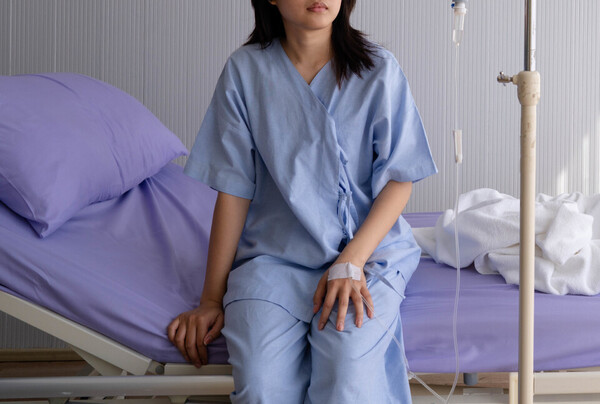
A court has found a psychiatric hospital liable for failing to prevent a patient's suicide attempt due to staff’s negligence, resulting in his death. However, it restricted the level of liability to 50 percent.
The Chuncheon District Court recently ruled in partial favor of a medical institution in the appeals trial regarding a claim for compensation and the confirmation of non-existence of debt between the hospital and the National Health Insurance Service (NHIS).
Of the 61,027,110 won ($46,023) in compensation demanded by the NHIS, the court ordered the hospital to pay 30,513,555 won and delayed interest.
The lawsuit began when a patient at the mental hospital operated by a medical corporation died after being treated for two years following a suicide attempt.
The deceased patient was involuntarily admitted to the hospital in August 2020 due to schizophrenia. At the time, the medical staff placed him in a single room for 14 days after his admission, following the government guidelines to prevent him from contracting Covid-19. On the seventh day of isolation, the patient attempted suicide by wrapping a towel around the bars of his room.
He was found by a nurse and rushed to another hospital after performing CPR, but fell unconscious due to anoxic brain injury. The patient was transferred to a different hospital, where he was hospitalized and died in April 2022.
NHIS said that since it paid 61,027,110 won in medical benefits to the two hospitals where the patient was treated, the medical corporation should compensate for the damages under Article 58 of the National Health Insurance Act. The state insurance company claimed that the medical staff at the mental hospital "misjudged the patient's suicide risk and neglected patient management."
However, the medical corporation refused to compensate for the damages, saying its medical staff was not negligent. It argued that the schizophrenic patient did not belong to the high-risk group of suicide and that the hospital had no responsibility for preventing his death from a suicide attempt.
According to the medical record review at the first trial, the medical staff at the psychiatric hospital assessed the patient’s risk of suicide as "nearly none." During hospitalization, the patient had no history of suicide attempts but exhibited severe psychotic symptoms, excitement, anxiety, and behavioral problems. In the cause of death document, his spouse wrote that he "kept asking to be taken out of the room after being admitted to a single room and told the nurse several times to jump out of the window but was ignored."
The Korea Medical Dispute Mediation and Arbitration Agency said, "The medical staff's suicide risk assessment was inappropriate, but agitation and refusal to enter the room are not signs of suicide. It is difficult to conclude that the patient was a patient with a high risk of suicide."
The agency went on to say, “The treatment of schizophrenia was appropriate, and it is highly unlikely that the risk of suicide was increased by the psychotropic medication administered by the medical staff. Patients with schizophrenia are at high risk of suicide if they show acute psychotic symptoms or depression and in the months following discharge from the (hospital)."
However, the agency said the isolation and monitoring of the patient was inadequate. Nursing observation notes were not recorded after 6 p.m.; there was no evidence that doctors specifically instructed nurses or nursing assistants to monitor patients after ordering seclusion. The agency also pointed out that the isolation unit at the psychiatric hospital was poorly designed to prevent suicide attempts.
"If the patient had asked to be allowed to leave the isolation room and had said several times that he would jump, as his spouse had described, this would have been an indication of a suicide attempt," it said.
The appeals court held that the medical staff of the psychiatric hospital had failed to prevent the patient's suicide attempt by neglecting their duty of care and surveillance and that the NHIS could subrogate its claim for damages.
"Even though the patient already showed severe schizophrenia symptoms at the time of admission and was at some risk of suicide, the medical staff concluded that his risk of suicide was 'nearly none' after hearing only that he had no history of suicide attempts. The attending physician's assessment of 'low' but it constituted negligence," the appeals court said.
The tribunal went on to say, "Shortly after being hospitalized, the patient became agitated and refused to enter the ward, claiming that his spouse had deceived him. As the nursing observation records of the mental hospital were poor, the absence of relevant records here does not mean that the spouse's description that ‘the patient said he was going to jump’ is not true."
It pointed out that the patient showed signs of suicidal behavior, including multiple threats to jump out, but the medical staff ignored them. It did not take specific suicide prevention measures, adding that this failed to prevent the patient’s suicide attempt and resulted in his death.
However, the court limited the medical staff's liability to 50 percent.
"While the patient bears the greatest responsibility for the suicide attempt, he was admitted to the psychiatric hospital to receive specialized care and treatment from mental health for an illness that was not an ordinary illness," the tribunal said, "The patient at a higher risk of suicide than the average patient. Medically and socially, psychiatric hospitals must take great care to prevent inpatient suicide. The responsibility of the medical staff cannot be considered light."
Accordingly, the tribunal ordered the medical corporation to pay 50 percent of the compensation sought by the NHIS plus delayed interest while dismissing the remaining claims of both parties.

